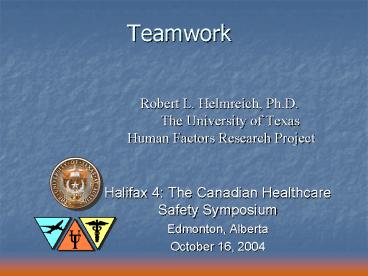Teamwork - PowerPoint PPT Presentation
1 / 19
Title:
Teamwork
Description:
Failures of teamwork in complex organizations can have deadly effects ... Doctors are from Missouri. The Show Me State. Show me why this is important' ... – PowerPoint PPT presentation
Number of Views:130
Avg rating:3.0/5.0
Title: Teamwork
1
Teamwork
- Robert L. Helmreich, Ph.D.
- The University of Texas
- Human Factors Research Project
- Halifax 4 The Canadian Healthcare Safety
Symposium - Edmonton, Alberta
- October 16, 2004
2
Why teamwork matters
- Most endeavors in medicine, science, and industry
require groups to work together effectively - Failures of teamwork in complex organizations can
have deadly effects - More than 2/3 of air crashes involve human error,
especially failures in teamwork - Professional training focuses on technical, not
interpersonal, skills
3
It is said that getting the diverse groups in
medicine to work together is like herding cats
4
(No Transcript)
5
The Medical Setting
6
Errors Medical Teams Make
- 1. Task Execution Unintentional physical act
that deviates from intended course of action - 2. Procedural Unintentional failure to follow
mandated procedures - 3. Communication Failure to transmit
information, failure to understand information,
failure to share mental model - 4. Decision Choice of action unbounded by
procedures that unnecessarily increase risk - 5. Intentional Noncompliance Violations of
formal procedures or regulations
7
Barriers to Effective Teamwork
- Status hierarchies
- Nurse-doctor
- Technician - doctor
- Resident Attending
- Fear of embarrassment or discipline
- Suppressing discussion of errors
- Culture
- Organizational national professional
8
Other Barriers
- Tolerance of detrimental behaviors
- Handwriting, nurse-physician conflict
- Variability of practice standards
- Individual variation in medical procedures
- Lack of meaningful training in effective
communication and teamwork
9
Doctors are from Missouri The Show Me State
- Show me why this is important
- I have better things to do with my time than
attend some seminar about teamwork and
communications
10
Making the case for team training
11
Communicate the relevance of effective teamwork
as a threat and error countermeasure
- Sources of threats to safety
12
Threats to Safety in Medicine
Organizational Organizational Culture Scheduling
Staffing Experience levels Work Load Error
policy Equipment issues
System - level National culture Health-care
policy and regulation Payment modalities Medical
coverage
Professional Proficiency Fatigue Motivation Cultur
e (Invulnerability)
Patient Primary illness Secondary illness Risk
Factors Atypical response to treatment Ongoing
management
Expected Events and Risks Unexpected Events and
Risks Well known and expected
13
Data are critical
14
Sources of data on teamwork
- Analysis of adverse and sentinel events
- Confidential, non-jeopardy, near-miss and
incident reporting systems - Data showing how positive teamwork prevents error
and enhances error management - Teamwork as a threat and error countermeasure
- Local data are most compelling
15
Training to enhance teamwork
- The nature of error and error management
- Culture and communications
- Expert decision-making
- Training in using specific behaviors and
procedures as countermeasures against threat and
error - Briefings
- Inquiry
- Sharing mental models
- Conflict resolution
- Fatigue and alertness management
- Analysis of incidents and accidents
- both positive and negative aspects
16
Organizational initiatives to enhance teamwork
- Define a clear policy regarding human error
- Accept error but not intentional non-compliance
- Institute formal procedures where possible
- Use confidential reporting systems to uncover
threats and sources of error - Provide formal training in teamwork and threat
and error management - Aviations Crew Resource Management adapted to
medicine and based on local culture and data
17
The University of Texas Threat and Error
Management Model (TEMM)
- Conceptual framework for formal training in
threat and error management - Used for analysis of adverse and sentinel events
and close calls
18
(No Transcript)
19
- The University of Texas
- Human Factors Research Project
- www.psy.utexas.edu/HumanFactors































